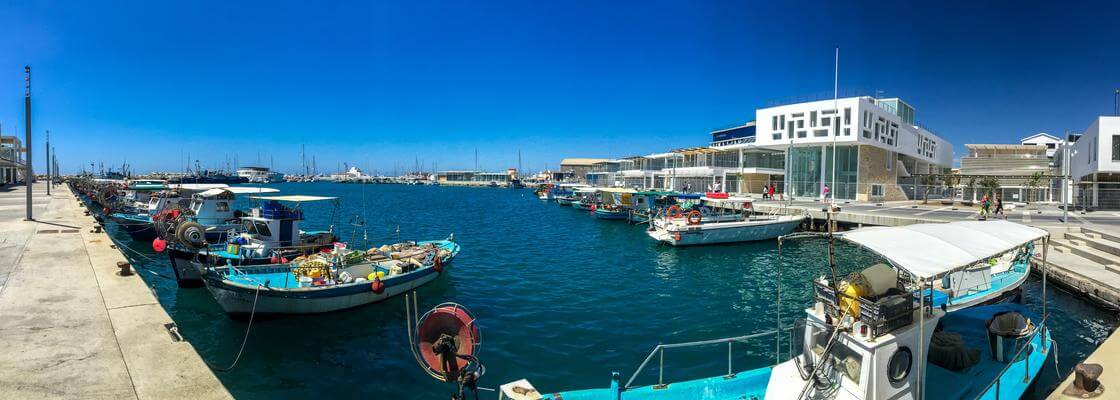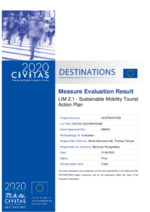
Limassol (Cyprus)
Limassol is located on the southern coast of Cyprus, an island country in the Eastern Mediterranean and the third largest and third most populous island in the Mediterranean. The Limassol region, with 240,000 local residents, is divided into six municipalities and 104 villages, spread over an area of 9,251 km2. The area welcomes around 400,000 visitors by plane and 200,000 by cruise ship.
Limassol is a safe destination with much to share, including its beautiful seafronts, picturesque countryside, countless cultural, recreational and leisure activities, vibrant events and festivals, as well as being a centre for international business, conferences and incentive travel programmes. Despite tourist mobility patterns in Limassol being mainly characterised by walking and cycling, there is evidence that residents’ mobility behaviour poses a key challenge. The prevailing use of private vehicles causes congestion and increases air and noise pollution and traffic accidents, especially in the central part of the city.
The city has worked to increase the use of sustainable mobility modes, with a view towards a city with less traffic, fewer accidents and cleaner air quality. Limassol needed to improve the environmental sustainability of its transport system, as well as promote behavioural change towards more sustainable transport modes.
Fast Facts
248,300 (2019)
Population
170 inhab/km2 (2019)
Population density
Limassol after DESTINATIONS
Cleaner and more energy public and private fleets
- + 80 new e-cars, 2020;
- + 7 Electric Vehicle (EV) charging stations (including four with shelters) by 2020;
- + 195 new conventional bikes from 2016 to 2019;
- + 11 new e-bikes from 2016 to 2019.
More attractive public transport (PT)
- 95% of tourists and residents satisfied with the PT upgrade, 2019-2020;
- 14% of tourists and residents transported bikes by bus, 2019-2020;
- 95% increase in the accuracy of bus route timetables, 2019-2020;
Behaviour change towards more sustainable transport modes
41% of tourists and residents were cycling, 2019-2020;
24% of tourists and residents were walking/hiking, 2019-2020;
+ 0,4 km of cycle network from 2016 to 2019;
+ 256.1 km of roads and streets with pavements (sidewalks) and bike lanes from 2016 to 2019;
- 250 tons of CO2 and - 47 dB of noise pollution, achieved by encouraging shifts to cycling and walking more from 2016 to 2020;
- 5,760 litres of fuel consumed (saving €7,142.40 on fuel costs) since the upgrading of cycling and walking, between 2016 and 2020;
93% of tourists and residents were aware of touristic maps and guides, 2019 to 2020;
35% of disabled people were satisfied with accessibility of mobility, 2019;
2,449 students involved in road safety trainings and the use of sustainable mobility modes for commuting to school, 2018- 2020;
Hoteliers and local businesses as ambassadors of sustainable mobility
- Established cross-sector business partnerships to create win-win agreements to promote sustainable mobility by providing discounts (applicable to 22 businesses) and advantages for PT travellers that use the Tourist Mobility Card (190 cards);
- Award hotels promoting sustainable mobility with the Green Label Award;
- Collect the used cooking oil from restaurants and hotels.
Strategic Plans: SMTAP (Sustainable Mobility Tourist Action Plan) and SULP (Sustainable Urban Logistic Plan) – to be undertaken over the long-term to promote sustainable mobility and improve freight operations.
Future activities
Limassol’s partners will continue to support the operation of infrastructure, services and systems created, installed and constructed during DESTINATIONS. LTC has already secured the budget to continue increasing output and results, such as the expansion of bike lanes, paths and routes and the installation of new infrastructure to create a new, accessible mobility point for disabled people. Also, Limassol partners have included in their communication strategy the promotion of all sustainable mobility modes, as well as all services implemented during DESTINATIONS.




















